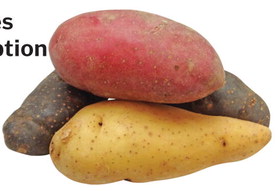Prairie Fare: Keep Your Eyes On Potatoes As A Menu Option


Potatoes provide many essential vitamins and minerals, especially vitamin C and potassium
We made our annual trip to a potato festival in Barnesville, Minn., in August. I enjoyed my bowl of potato dumplings. I also had mashed potatoes and meatballs for the rest of my “stick-to-your-ribs” dinner.
My husband and I texted our kids pictures of our food. They live three to four hours away from us. They were a little envious because they always attended when they lived at home. We all love potatoes.
I grew up in a “meat and potatoes” kind of family. Besides those two staples, we always had some kind of vegetable. Occasionally, we had potato dumplings as a tribute to our heritage.
We actually did not have dessert very often as part of the meal. This week, I am provided a special potato-based treat, Potato Brownies, from North Dakota State University’s potato breeder, Susie Thompson. By the way, we tried it, and it was a big hit among our taste testers.
Potatoes have a very long history, dating back more than 7,000 years. They were brought to Europe in the 1500s by Spanish explorers and made their way to America.
On average, a medium potato has about 110 calories, 2 grams of fiber and 3 grams of protein.
Sometimes potatoes are perceived as not so healthy; however, I would disagree. Potatoes are rich in complex carbohydrates, so they are a good source of energy. They provide many essential vitamins and minerals, especially vitamin C and potassium.
On the other hand, if you order your potato “loaded” with butter, sour cream, bacon bits, cheese and other toppings, your tasty menu item has extra calories and fat. In fact, a loaded potato might have 450 to 650 calories.
Potassium is a mineral that helps with good functioning of our heart, muscles and nerves. Vitamin C helps our skin heal from wounds and helps our immune system function properly.
In fact, the vitamin C in potatoes helped prevent scurvy among early populations. Scurvy was a potentially fatal illness linked to missing vitamin C in the diet.
Potatoes also provide some iron needed to help carry oxygen throughout the body and vitamin B-6 needed to help the nervous system and immune system function well.
If you eat the potato skin, you get the advantage of consuming fiber. Eating enough fiber helps our digestive system function well.
You may have noticed potatoes of various colors. Remember that different potatoes have various best uses.
Red potatoes are excellent for potato salad or soup and for mashing. Have you tried “smashed potatoes”?
Brown-skinned russet potatoes are excellent for baking, roasting and fries. White or yellow-skinned potatoes, such as Yukon Gold, often are
(Pixabay photo)


